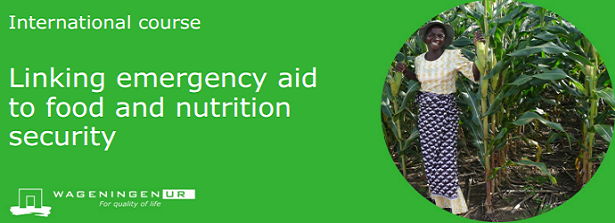
Emergency/food aid is often criticized as a donor driven response, creating dependency in the short term, and undermining incentives for local agricultural development in the longer term. Usually, little is done to encourage people to build a better life and prevent them from falling back into situations where they need assistance again.
Avoiding the pitfalls of help-induced dependency
Closing the gap between emergency aid and development
In this course we will explore how to bridge the gap between emergency assistance and developmental food and livelihood security support. Building resilience of livelihoods, necessary to make the position of households robust. Responses to emergency situations have to be seen and used as an initial step towards sustainable development.
In this interactive course, participants learn to make use of theoretical and conceptual thinking on food security. We will work with practical examples of policies and programs of the critical path of transition from aid to food security.
Course objectives
Upon completion of the course you will:
- have insight in the typology of emergencies – and the responses that contribute to food security;
- be better aware of causes of food insecurity outside the direct context of the household (on regional, national or even global levels);
- have clear ideas for lobby and advocacy for policies to facilitate a more developmental approach to emergencies;
- be able to apply tools for developing programs or interventions to contribute to structural development.
Target audience
- Mid-career officials working for a governmental and non-governmental organisation in one of the following positions:
- you are a policy or planning officer at national or sub-national level with responsibility for emergency situations;
- you have a managing or co-ordinating position in planning, management and/or implementation of a community food security and nutrition programme or rural development programme;
- you are a representative of civil society involved of structural development in emergency areas.
- This event has passed.

